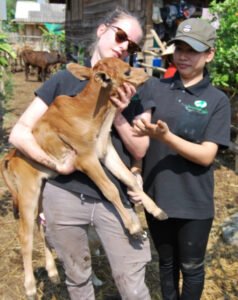
Meet Dr Nichola Calvani, DECRA Fellow and Lecturer in Parasitology in the Sydney School of Veterinary Science at the University of Sydney and founder of ‘Herminthology’, which aims to promote and support women working in the discipline of parasitology. Here she talks about liver fluke, One Health and the importance of mentors in her career.

What is your current role and how did you get to be there?
I am currently an ARC DECRA Fellow and Lecturer in Parasitology at the University of Sydney. I completed a bachelor’s degree in animal and veterinary bioscience at the University of Sydney in 2016, which I immediately followed with a PhD in molecular parasitology, also at the University of Sydney.
During my PhD, I lived and worked with local farmers and their livestock in Cambodia and Laos, and was fortunate to travel to Europe several times for training courses and a research exchange at the University of Liverpool. Towards the end of my PhD, I spent 9 months working as a Technical Officer running the molecular diagnostic laboratory at the Veterinary Pathology Diagnostic Services (VPDS) laboratory. Delayed by COVID-19 border closures, I worked as a technician in the parasitology laboratory at the Elizabeth Macarthur Agricultural Institute (EMAI) for several months at the end of 2020. Finally, at the start of 2021, I left Australia to work as a postdoctoral researcher in the Molecular Parasitology Laboratory at the University of Galway, Ireland – the most influential and respected lab in my field. I returned to Australia as a continuing academic in August 2023, and commenced my current fellowship in January 2024.
How does your work contribute to the field and/or overall health and wellbeing of the community?
I primarily work on a zoonotic parasite of livestock with a global distribution – the common liver fluke. This parasite is a major cause of production losses in cattle and sheep globally, and significantly impacts the quality of life of millions of people in low- and middle-income countries, primarily women and children. Unfortunately, due to its innate requirement for a host, studies on the control of these parasites has previously been hindered by the need for animal infections and in vivo laboratory models. My DECRA aims to exploit three-dimensional cell-culture methods to reveal the secret lives of these parasites for the first time, increasing our research capacity in an ethical manner by taking animals out of the equation. In doing so, we hope to reveal insights on the drivers of parasite invasion, migration, and development in their mammalian hosts, with the ultimate goal of identifying and exploiting weaknesses for parasite control in the form of drugs and vaccines.
What is a project you would love to get off the ground or a skill you would like to develop, if you had the opportunity?
My dream research project is to design and validate a sustainable One Health approach to the surveillance, control and prevention of liver fluke infection in smallholder farming communities throughout Asia, Africa and the Middle East. The implications on human and animal welfare, productivity, food security and quality of life are enormous. I’m slowly working my way towards this goal by expanding my skillset and collaborative networks, progressing our understanding of the fundamental biology of this ubiquitous parasite, and building my lab from the ground up. The next skill I’m looking to gain to help me get there is a thorough understanding of bioinformatic analysis of large molecular datasets. If you’ve got any tips or tricks on how to make this happen, let me know!
What are your loves outside of work?
I’ve lived overseas for the last 3 years, so currently I’m loving spending time with friends and family outside of work, going for bushwalks and exploring more of the country I’ve missed!
What is one piece of advice you could pass onto others following their own career in health and medical research sector?
Although I have worked extremely hard to get to where I am today, I owe a lot of my success to my diverse and supportive mentors. Hence, my advice is to get a few key mentors to help plan and guide you through the snakes and ladders of academia. The more diverse the better!
